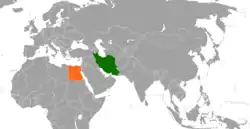Egypt–Iran relations
Egypt–Iran relations refers to the current and historical relations between Egypt and Iran. Following the Egyptian Revolution of 2011, Iran appointed its first ambassador to Egypt in almost 30 years.[1] Despite oft-wavering tensions between the two countries, they share membership in the OIC and the Developing 8.
 | |
Iran |
Egypt |
|---|---|
According to a 2013 BBC World Service poll, 15% of Egyptians view Iran's influence positively, with 48% expressing a negative view.[2]
In a 2012 poll conducted by the Israel Project where 812 Egyptians were questioned about Iran's nuclear programs, 61% of the 812 individuals expressed support for the Iranian nuclear program.[3]
History
Relations between Iran and Egypt go back several thousand years, with both countries being two of the greatest ancient civilizations in the world, the Egyptian civilization and Persian civilization. Egypt was ruled by two Iranian great empires (Achaemenid and Sasanian respectively).
In 1939, diplomatic relations between Egypt and Iran were upgraded to ambassadorial level,[4] and Youssef Zulficar Pasha was appointed as Egypt's first ambassador in Tehran. In the same year, Princess Fawzia of Egypt, the sister of King Farouk I, married Mohammad Reza Pahlavi, the then crown prince (later shah) of Iran.[4]
The relationship between Iran and Egypt had fallen into open hostility after the Egyptian Revolution of 1952 which brought Gamal Abdel Nasser to power and the CIA-backed coup d'état in Iran in 1953 which saw the return of the Shah Mohammad Reza Pahlavi to power. Following Nasser's death in 1970, the presidency of Anwar Sadat turned this around quickly into an open and cordial friendship. In 1971, Sadat addressed the Iranian parliament in Tehran in fluent Persian, describing the 2,500-year-old historic connectivity between the two nations. Overnight, Egypt and Iran were turned from bitter enemies into fast friends. The relationship between Cairo and Tehran became so friendly that the Shah of Iran (Persia), Mohammad Reza Pahlavi, called Sadat his "dear brother." After the 1973 war with Israel, Iran assumed a leading role in cleaning up and reactivating the blocked Suez Canal with heavy investment. Iran also facilitated the withdrawal of Israel from the occupied Sinai Peninsula by promising to substitute with free Iranian oil the loss of the oil to the Israelis if they withdrew from the Egyptian oil wells in Western Sinai. All these added more to the personal friendship between Sadat and the Shah of Iran.
"Ties between the countries—among the largest and most influential in the Middle East—were turned hostile once again following the Islamic Revolution in Iran in 1979. Diplomatic relations between the two severed in 1980 following the admission of the deposed Shah of Iran to Egypt (where he died and was buried) and Egypt's recognition of Israel."[5] Egypt's 1979 peace agreement with Israel also led to tense relations and Iran ceased direct flights to Egypt.[6]
Egypt is the only Arab country without an embassy in Iran.[7] Contentious issues include Egypt's signing of the Camp David Accords with Israel in 1979, its support for Iraq in Iran's eight-year conflict, the Islamic Republic's hailing of Khalid Islambouli, the late President Anwar Sadat's assassin as a religious hero, seeing as there was both a street and mural named after him (however, the honouree was changed to Muhammad al-Durrah, the 12-year-old Palestinian boy shot and killed during the outset of the Second Intifada), and close Egyptian relations with the United States, and most of the Western European countries. In 2007, relations between the two countries thawed in the fields of diplomacy and economic trade, only to retreat during the 2008–2009 Israel–Gaza conflict when Iranian and Egyptian politicians exchanged blames over inaction towards the escalation of the conflict. It was not until the official resignation of President Hosni Mubarak in February 2011 that relations started to improve significantly. In April 2012, Iran appointed an ambassador to Egypt. Soon after Mohamed Morsi visited Iran in August 2012, it was decided to reestablish bilateral diplomatic relations, with rededication of embassy locations. A first ambassador was nominated to represent Egypt in Iran. While overall relations have been steadily improving, continued tensions between Iran, Saudi Arabia and allied Western nations have put this development into question.[8] In March 2013, direct flights between two countries were reinstated.[6] In July 2013, after the uprising and subsequent overthrow that removed Mohamed Morsi and his Muslim Brotherhood-dominated government, the interim Minister of Foreign Affairs, Nabil Fahmy announced that Egypt seeks stable and positive ties with the Islamic Republic of Iran.[9] It is unknown if relations have improved since then.
Bilateral visits
Following the Egyptian Revolution of 2011, and the appointment of ambassadors after nearly 30 years, Egyptian President Mohammed Morsi made a historic first visit to Iran since the Iranian Revolution for the 2012 Non-Aligned Movement summit on 30 August, where it handed over the rotating presidency to Iran.[10] Iranian president, Mahmoud Ahmadinejad also visited Egypt in February 2013, making him the first Iranian president to travel to Egypt since the Iranian Revolution.[11]
See also
References
- "Iran appoints ambassador to Egypt, first in 30 years". Reuters. 19 April 2011. Retrieved 9 August 2013.
- "BBC World Service Poll : Views of China and India Slide While UK's Ratings Climb: Global Poll" (PDF). Globalscan.com. Retrieved 1 October 2016.
- "New poll: Egyptians turning toward Iran, want nuclear weapons | Foreign Policy". Thecable.foreignpolicy.com. 19 October 2012. Retrieved 1 October 2016.
- Al Sherbini, Ramadan (5 February 2013). "Egypt and Iran on long, bumpy road". Gulf News. Retrieved 9 August 2013.
- Iran appoints ambassador to Egypt, first in 30 years Reuters. 19 April 2011
- "Chronology: Egypt". The Middle East Journal. Summer 2013. Retrieved 3 September 2013. – via Questia (subscription required)
- Ahmadinejad unwelcome in Egypt: lawyer, Al Arabiya. 2 July 2009
- official says Cairo may open embassy in Iran soon, reports Iranian media Egypt Independent, 28 August 2012
- Cairo seeks stable, positive ties with Tehran: Egypt FM Press TV. Retrieved 2 November 2013.
- "Egypt's Morsi to make historic trip to Tehran". Al Jazeera. 18 August 2012. Retrieved 9 August 2013.
- "Iran's president begins historic Egypt visit". Al Jazeera. 5 February 2013. Retrieved 9 August 2013.
.svg.png.webp)
